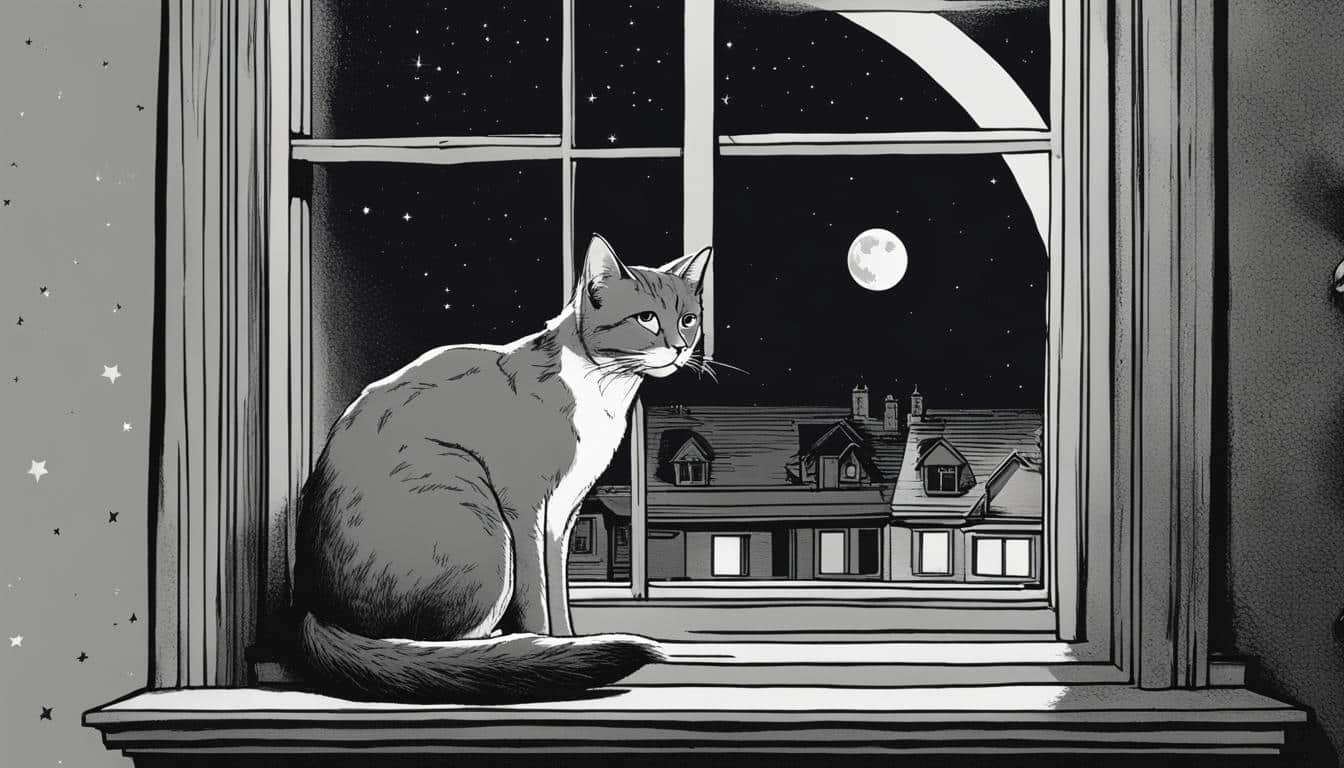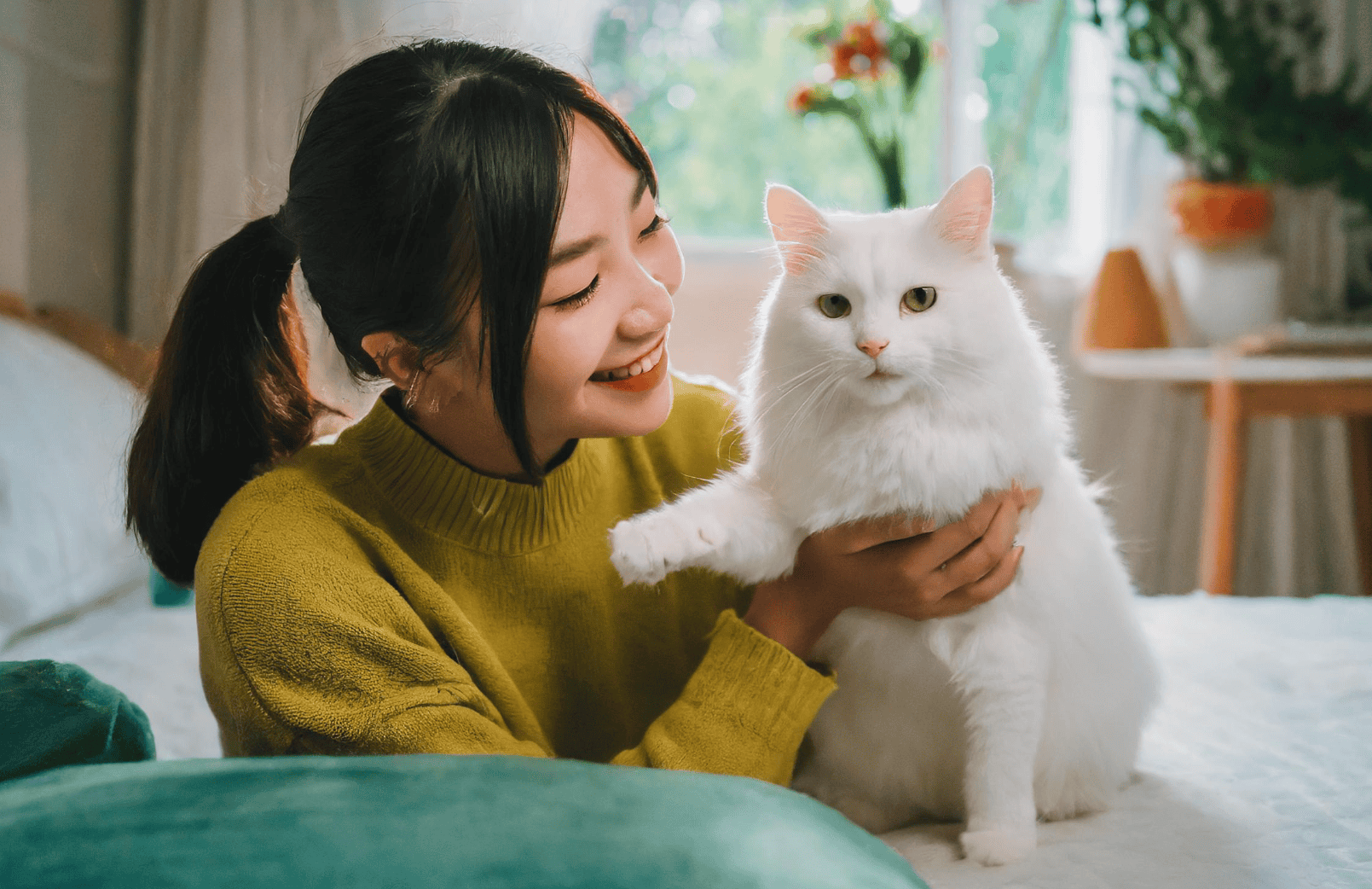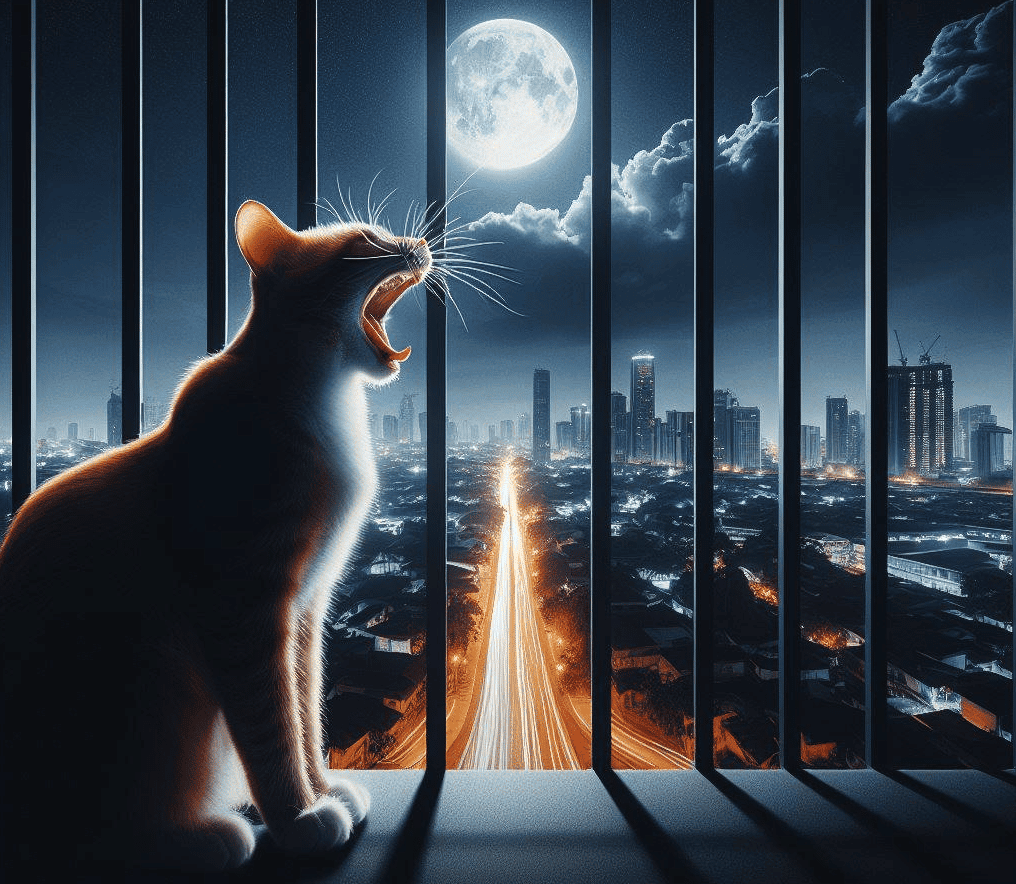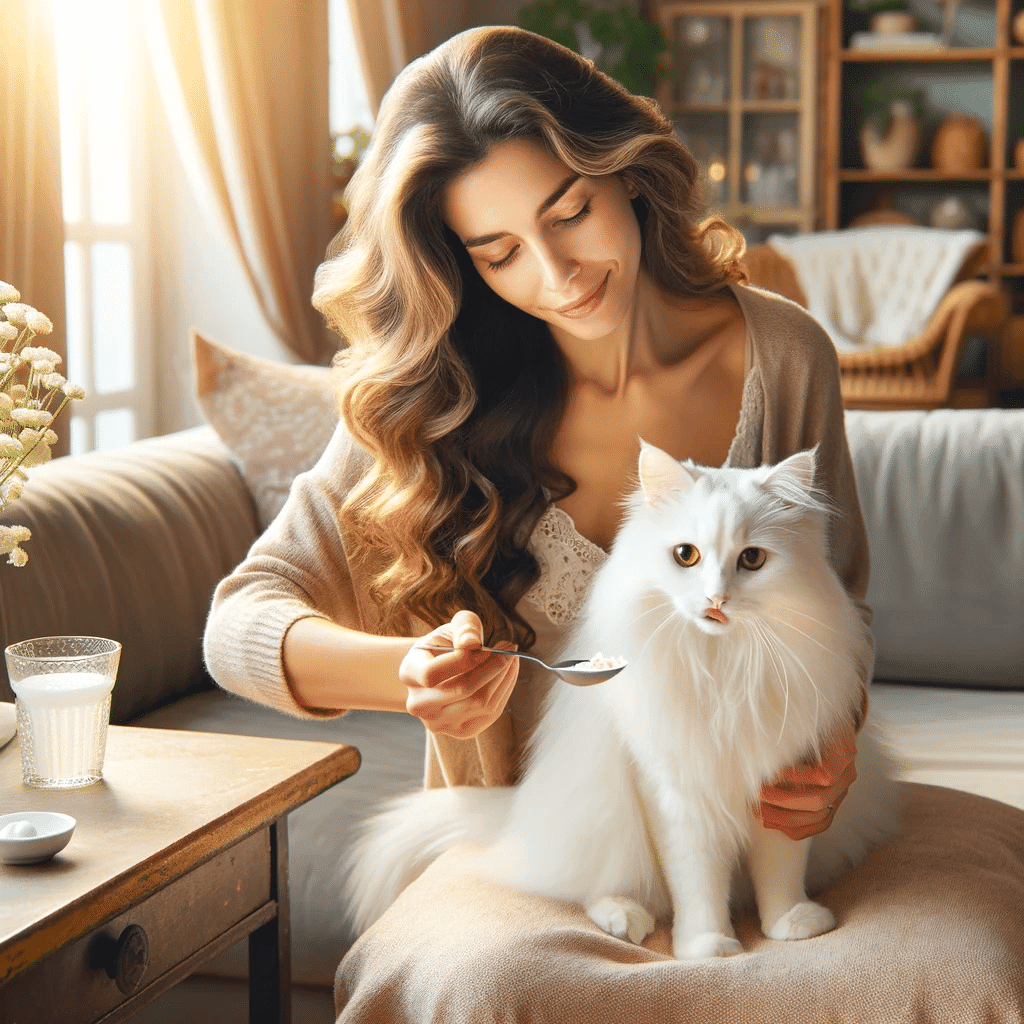
Cats are known for their unique vocalizations, and it can be quite puzzling and frustrating (Doofy meows at night too) when your furry companion starts meowing excessively at night.
Whether it’s a soft meow or a loud yowl, understanding why your cat meows a lot at night can help address their needs and a night of peaceful sleep for you.
Nocturnal cat behavior is influenced by many factors, including their instincts, physical and emotional needs, and potential underlying medical issues.
By delving deeper into the reasons behind their nighttime meowing, we can all take the necessary steps to help alleviate their distress and maintain a harmonious sleeping environment.
Brief Synopsis
Cats meow at night seeking attention, food, or play, and medical conditions like hypertension or hyperthyroidism can also cause it. Behavioral factors such as boredom or anxiety play a role too. Establishing a nighttime routine and providing mental and physical stimulation can reduce excessive meowing. For tailored advice, consulting with a veterinarian or animal behaviorist is recommended.
Common Causes of Cat Meowing at Night
Understanding the specific cause of your cat’s meowing at night is crucial for finding the right solution.
By satisfying their underlying needs and providing appropriate care, you can help reduce nighttime meowing and establish a harmonious sleep routine.
Reasons for Cat Meowing at Night
Attention-seeking
Cats are social creatures and may meow at night to gain your attention. They may want to play, be fed, or be around you.
Establishing boundaries and not reinforcing this behavior by responding to their meows immediately is important.
Instead, provide attention and playtime during the day when your cat is quiet and reward their quiet behavior.
Anxiety
Cats can experience anxiety or stress, especially if there have been changes in their environment or routine.
Common triggers include moving to a new home, a new pet or family member, or loud noises.
Creating a calm and safe space for your cat, providing comforting scents or pheromone products, and consulting with a veterinarian can help manage their anxiety and reduce nighttime meowing.
Sexual maturity
If your cat is sexually mature and not spayed or neutered, they may meow excessively at night during their mating season.
This behavior is their way of seeking a mate. To stop such behavior and improve their well-being consider having your cat spayed or neutered.

Medical Conditions that Cause Nighttime Meowing in Cats
Excessive meowing at night in cats can often be attributed to various medical conditions.
If you suspect that your cat’s nighttime meowing is due to a medical condition, it’s crucial to consult with a veterinarian.
They can conduct a thorough examination, perform necessary tests, and recommend appropriate treatment options based on your cat’s needs.
Such a proactive approach to addressing medical conditions can help alleviate nighttime meowing and ensure your cat’s overall well-being.
Here are some medical reasons why your cat may be meowing at night:
Hypertension
Hypertension, or high blood pressure, can cause cats to experience discomfort and restlessness, leading to nighttime meowing.
This condition is more common in older cats and can be managed through medication and lifestyle changes.
Hyperthyroidism
Hyperthyroidism is an overactive thyroid gland that can cause increased appetite, weight loss, and excessive meowing.
Treatment options for hyperthyroidism include medication, surgery, or radioactive iodine therapy.
Pain or Discomfort
Cats may meow at night if they are experiencing pain or discomfort. This could be due to various reasons, such as arthritis, dental issues, or urinary tract infections.
Regular veterinary check-ups and appropriate pain management can help alleviate these symptoms.
Cognitive Decline
Older cats may experience cognitive decline, similar to dementia in humans, which can contribute to meowing at night.
This condition is known as feline cognitive dysfunction and may be accompanied by other symptoms like confusion and changes in behavior.
Environmental enrichment and specific medications can help manage this condition and improve your cat’s quality of life.
How to Address Attention-Seeking Behavior in Cats at Night
If your cat meows at night to seek attention, it’s important not to reinforce the behavior by responding to their meows or giving in to their demands.
Instead, provide attention and playtime during the day when your cat is quiet, rewarding their quiet behavior.
Engaging in interactive play sessions before bedtime can also help tire them out and reduce attention-seeking meowing at night.
Creating a stimulating environment for your cat is essential to prevent attention-seeking behavior at night.
Be sure they have access to engaging toys and scratching posts they can use during the night. Providing a comfortable and cozy sleeping area can also help them feel secure and reduce the need for constant attention.
If your cat continues to meow at night for attention despite these efforts, consult a veterinarian or animal behaviorist for further guidance.
They can provide professional advice tailored to your cat’s specific needs. They can also help you develop a plan to fix their attention-seeking behavior effectively.

Managing Cat Anxiety at Night
Cats are sensitive creatures.
They can experience anxiety or stress that may cause them to meow at night.
Understanding and addressing this anxiety is crucial for promoting a peaceful sleep environment for you and your feline friend.
To manage cat anxiety at night, it’s important to create a calm and safe space for your cat.
Assign them a designated area where they feel secure, such as a cozy bed or hiding spot. You can also add comfort by placing familiar objects, like their favorite blanket or toy around their sleeping area.
Using pheromone products, such as sprays, diffusers, or collars, can also help alleviate cat anxiety.
These products release synthetic pheromones that mimic the calming scents naturally produced by mother cats, creating a sense of security for your cat.
Monitoring and Analyzing Cat Vocalizations at Night
Another helpful strategy in managing cat anxiety at night is to monitor and analyze your cat’s vocalizations.
Try to pay attention to the specific sounds they make and try to identify any patterns or triggers. Recording their meowing using a voice recorder or a pet monitor can assist in analyzing their vocalizations.
By understanding the context and frequency of their meowing, you can gain insight into their needs and emotions.
For example, if your cat’s meowing appears more frequent or intense during certain situations, such as when you’re preparing to leave the house, it may indicate separation anxiety.
Identifying these triggers can help you develop targeted strategies to address their anxiety.
| Meowing Sound | Possible Meaning |
|---|---|
| High-pitched, repetitive meow | Hunger or discomfort |
| Low-pitched, growling meow | Aggression or fear |
| Soft, melodic meow | Seeking attention or play |
| Repeated short meows | Feeling anxious or stressed |
Remember, every cat is unique, and their vocalizations may vary.
Paying attention to these signals can help you better understand your cat’s anxiety and address their needs effectively.
Ensuring Proper Nutrition for Cat Hunger at Night
One possible reason why your cat meows at night is due to hunger.
Cats can have increased activity levels during the nighttime hours, which may lead to a higher demand for food.
Addressing your cat’s nighttime hunger is essential for promoting a peaceful night for your feline companion.
To address your cat’s nighttime hunger, consider adjusting their feeding schedule.
You can try providing a small meal right before bedtime or using a timed feeder to dispense food during the night.
This can help satisfy their hunger and prevent them from meowing for food.
Additionally, introducing food puzzles can be a beneficial way to provide mental stimulation and make their food last longer throughout the night.
Food puzzles require cats to work for their food, which can help keep them occupied and satisfied.

Establishing a Nighttime Routine for Cats
Creating a nighttime routine for your cat can help promote a peaceful and restful sleep.
Cats are creatures of habit and thrive on consistency, so establishing a routine can signal to your feline friend that it’s time to settle down for the night.
Here are some steps to help you create a nighttime routine for your cat:
Engage in Calming Activities before Bedtime
Before bedtime, engage in calming activities with your cat to help them wind down. This can include gentle play sessions, grooming, or cuddling.
Avoid high-energy or stimulating activities that may leave your cat feeling overexcited or restless.
Maintain a Consistent Bedtime Schedule
Stick to a regular bedtime schedule for your cat.
Cats are creatures of habit, and a consistent routine can help regulate their sleep cycle.
Try to establish a bedtime that aligns with your sleep schedule, allowing you and your cat to get the much-needed rest.
The Importance of a Consistent Routine
Establishing a nighttime routine for your cat can be instrumental in managing their nighttime behavior.
Cats thrive on routine and predictability, so having a consistent schedule can help signal your cat that it’s time to settle down and sleep.
NLP Techniques for Distinguishing Different Cat Vocalizations at Night
Understanding the different vocalizations made by your cat at night can be a valuable tool in deciphering their needs and emotions.
One technique that can assist in analyzing cat vocalizations is Natural Language Processing (NLP).
NLP utilizes advanced algorithms to process and interpret human language, including the sounds and patterns of cat meowing.
By applying NLP techniques to cat vocalizations at night, researchers have been able to identify various patterns and correlations between specific meowing sounds and different feline behaviors.
For example, certain types of meows may indicate hunger, while others may signify playfulness, anxiety, or distress.
Analyzing these vocalizations can provide valuable insights into your cat’s nighttime behavior and help you respond appropriately to their needs.
While NLP techniques can offer valuable insights, it’s important to remember that they are not foolproof and should be used with other observation and assessment methods.
Every cat is unique, and their vocalizations may vary based on individual personalities and experiences.
Consulting with a veterinarian or animal behaviorist can provide further guidance on understanding your cat’s vocalizations and tailoring your response accordingly.
Benefits of NLP for Analyzing Cat Vocalizations
- Identification of specific meowing patterns and their corresponding meanings
- Improved understanding of your cat’s emotional state and needs
- Enhanced communication with your feline companion
- Ability to address specific behavior issues more effectively
NLP techniques offer a fascinating avenue for analyzing and understanding cat vocalizations at night. By utilizing these techniques alongside other observation and assessment methods, you can gain valuable insights into your cat’s needs, emotions, and behavior.
| NLP Technique | Benefits |
|---|---|
| Spectral Analysis | Identify frequency and intensity variations in meowing |
| Machine Learning Algorithms | Automated classification of meows based on learned patterns |
| Sentiment Analysis | Interpret emotional state conveyed through meowing |
| Correlation Analysis | Link specific meowing patterns to environmental or behavioral factors |
To Sum Up…
Cat meowing at night can be a common behavior with various underlying causes. Understanding the reasons behind your cat’s nighttime meowing and implementing appropriate solutions can help ensure a peaceful night for both you and your feline companion.
Helpful Reads
- https://www.dailypaws.com/cats-kittens/behavior/cat-meowing-at-night
- https://modkat.com/blogs/modkat-purrr/6-tips-for-quieting-night-time-meowing
- https://vethelpdirect.com/vetblog/2022/06/04/5-reasons-why-your-cat-cries-at-night/

In her previous life, Lisa traveled extensively, both for work and leisure. After the pandemic struck, Lisa locked up her luggage and adopted a cat ever since.
Lisa is now an avid cat lover, she devotes most of her free time serving as butler to her adorable feline at home. When she is not with her cat, she can be seen using her phone sourcing for the latest cat supplies online.


